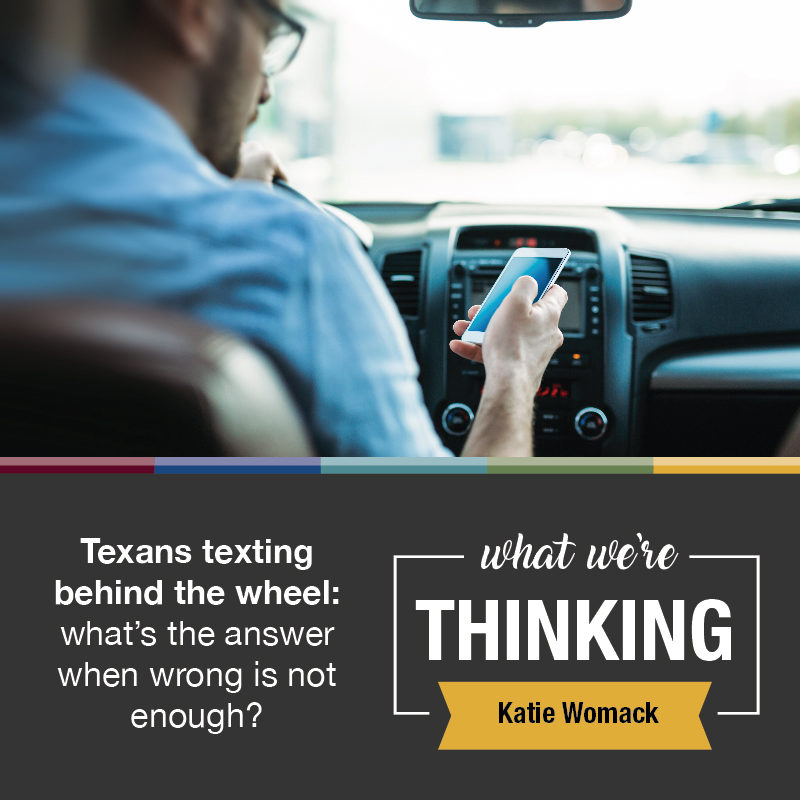Texans, by and large, think texting and driving is bad and that it shouldn’t be allowed. But for most, those views haven’t changed their own habits behind the wheel.
Texas legislators passed a law in 2017 that bans texting while driving, but allows drivers to use their phones for things like directions and music selection, and allows them to text when their vehicles are stopped. We see good news in the 5% decline in distracted driving crashes in Texas in the year after the law took effect. Driver behavior, on the other hand, doesn’t look so encouraging.
Before passage of the law, 91% of Texans considered texting and driving to be unacceptable But more than a year after the law’s passage, only a third of Texans say they’re texting behind the wheel less than they did before, while nearly half say they’re texting about the same amount or more.
After the law took effect, 65% of drivers said they had texted while driving within the previous 30 days. Though they acknowledge the danger, many drivers nonetheless seem to think they can manage the dual tasks safely.
These 2018 research results are based on an online survey called the Traffic Safety Monitor conducted by the Center for Transportation Safety at the Texas A&M Transportation Institute, in addition to data from an annual survey funded by the Texas Department of Transportation, plus actual observations of driver behavior in 18 urban areas.
We found that drivers who were more aware of the statewide ban were generally less likely to text and drive. Drivers in Wichita Falls had the highest awareness of the anti-texting law (76%), and the lowest texting-while-driving rate (3% of drivers there are texting at any given time). Austin drivers had a 75% awareness level, with a 3.7% texting rate. Our team discovered that Houston motorists are least compliant, with 9.1% of those drivers texting at any given time. Houston survey respondents also had the lowest awareness of the statewide ban, at 60%. Both Wichita Falls and Austin have local laws that ban hand-held phone use; Houston doesn’t.
Our findings aren’t all that encouraging, but they’re not necessarily shocking, either. To understand why, consider the example of drunk driving.
Impaired driving crashes kill more than 10,000 people in the U.S. every year. Still, those fatalities have fallen by a third over the last three decades, according to the National Highway Traffic Safety Administration. Over those years, two noteworthy things have happened.
One is that states have passed progressively more stringent laws to punish drunk drivers. In Texas, the legal blood alcohol concentration for drivers was 1.0 for many years. That BAC benchmark was lowered to .08 in 1999. In 2001, lawmakers banned open containers of alcoholic beverages in cars.
Second, advocacy efforts and evolving norms have made drunk driving less socially acceptable. Driving under the influence now carries a stigma that it didn’t carry 30 years ago.
Though we have far fewer years of data to look at regarding texting and driving, it’s arguable that the same two changes are taking place. States and cities are outlawing the practice, and people are increasingly acknowledging the risk. With a huge majority of Texans saying texting and driving is definitely not okay, and that laws banning it should be stiffer and more strongly enforced, it’s safe to say that LOL-ing behind the wheel is viewed as less smart than it was when smartphones were a new thing a decade ago.
But while Texans say that texting and driving is bad, their behavior isn’t changing. One in five crashes in Texas each year result from distracted driving, according to the Texas Department of Transportation. Distracted driving deaths rose 3% from 2010 to 2016 in Texas, even while DWI deaths over the same period fell by 5%. Even though texting while driving is only one type of distracted driving, it’s been a growing concern as cell phones have proliferated.
Impaired driving remains a problem, but we have seen improvement. And among widening circles of people, it’s something that you just don’t do. But texting and driving? For now, a lot of Texans seem to embrace a “do as I say, not as I do” philosophy. If our experience with drunk driving has taught us anything, we need to make sure people know the distracted driving law, and we’re also going to need attitude adjustment — and time.
Katie Womack is a Senior Research Scientist with the Texas A&M Transportation Institute.
This article was originally published in the TribTalk, August 25, 2019.
